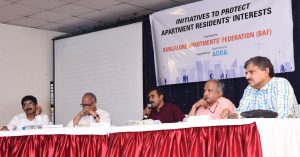Expert panel questions impractical BWSSB mandate and shares ideas to find solutions for waste water management
Bangalore Apartments Federation (BAF), a federation that represents and protects the interests of apartment complexes across Bangalore, organised a panel discussion where experts from the field of waste water management shared their views on the BWSSB notification mandating retrospective Sewage Treatment Plant (STP) and dual-piping implementation for apartments. The experts also shared perspectives which would help find practical solutions to the pressing issue of lake & water body pollution. The event saw participation from more than 70 members and representatives of Resident Welfare Associations (RWA) and other concerned members of the public from across the city. Participants at the event also got the opportunity to air their views on the issue.
The BWSSB mandate issued in March 2016 stated that apartments with twenty or more units should install STP & dual piping with retrospective effect. The order, which was issued without any consultation with relevant experts or any public dialogue has caused distress to lakhs of apartment residents as they have not been able to abide by the order due to enormous costs and space constraints among other reasons.
 Throwing light on how the issue developed, Mr. Nanda Kumar, former Chief Environmental Officer of Karnataka State Pollution Control Board (KSPCB) said, “The notifications from CPCB, KSPCB as well as Forest, Environment & Ecology Secretariat were clear that the implementation is with prospective effect but it is not clear why BWSSB has made it retrospective.â€
Throwing light on how the issue developed, Mr. Nanda Kumar, former Chief Environmental Officer of Karnataka State Pollution Control Board (KSPCB) said, “The notifications from CPCB, KSPCB as well as Forest, Environment & Ecology Secretariat were clear that the implementation is with prospective effect but it is not clear why BWSSB has made it retrospective.â€
Sharing his views on the impracticality of the mandate, Dr. Ananth Kodavasal, an expert in the field of waste water management,said, “There are space constraints & safety issues in addition to being a huge financial burden to implement STP retrospectively. In addition, tens of thousands of STPs across the city could pose a huge environmental hazard. Apart from this notification being impractical, the incremental benefits are negligible.â€
While discussing the problem is the first step, the panel also came up with potential solutions for the issue. Dr. T.V. Ramachandra, who is the Coordinator of Energy and Wetlands Research Group (EWRG) and Convener of Environmental Information System (ENVIS) at Centre for Ecological Sciences (CES) at Indian Institute of Science who has dedicated the past twenty years of his life to research in energy and environment, said “Apartments can do their bit by making sure that their existing STPs are properly functioning. In addition, they should come together to find innovative ways by which the treated water can be collected centrally and reused, rather than letting it out into storm water drains.â€
“In order to combat the issue of waste water, we need to come up with feasible long term solutions. Local area solutions which require relatively smaller infrastructure, through a public-private partnership model is a potential solution in the long run.†said Mr. Jaigopal Rao, who has been involved in the design and execution of a wide variety of eco-friendly cost-effective building technologies as architect and co-founder of Inspiration, a design group.
BAF has been fighting a number a critical issues faced by apartment residents since 2014. The organisation has previously filed a writ petition in the High Court of Karnataka on the 300% water tariff hike targeting apartments, has issued an online petition to the Hon’ble Chief Minister of Karnataka on retrospective STP implementation and has also published a white paper on the issue. Other issues that BAF is taking up include solid waste management, building violations and water conservation.



